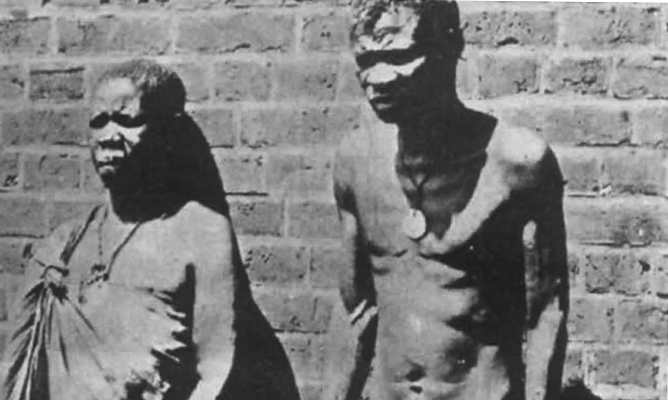
If the story of Zimbabwe were to be told in an objective manner, the topic of man-made starvation and suffering would feature prominently. Zimbabwe’s story cannot be told without mentioning the emptiness within.
By Masola wa Dabudabu
The country seems to be well-endowed with emptiness in many departments with more of nothing than anything.
The economy is about food security and all the inherent struggles relating to eating. Zimbabwe’s economy is no more and Zimbabweans are confronted by the lack of one of the main ingredients of life; food itself. People’s stomachs are empty, food bowls are empty and empty granaries stubbornly echo with the sullen shrills of hunger. The outlook has never been this bleak for the black nation of Zimbabwe.

The nation is driven to starvation whilst, somehow, its leaders prevaricate over mundane and insignificant issues. They do not care about the starving people just because they have easy access to foreign cuisine. The immoral Zanu PF has managed to include suffering, disease, pestilence and starvation in the menus of the people.
In our midst there is suffering then Zanu PF and some more suffering again. Off course Zanu PF has proved to be a fertile breeding ground for individuals who are willing to embarrass themselves by publicly displaying their emptiness. Amongst the group of empty-headed persons is the so-called erudite one; the one and only Jonathan Moyo. The professor has been known to bark loudest at any given opportunity even when it would have been prudent to shut up and learn.
Recently Moyo made a fool of himself when his misfiring mouth discharged a sadistic salvo linking Zimbabwe’s economic recovery to the retrieval of Mbuya Nehanda’s skull from Britain. According to Moyo, the people have to continue wallowing in poverty for as long as the skulls of the likes of Nehanda and others remain held in British museums. If Moyo was echoing the sentiments of his party, then Zimbabweans are indeed in for a rude awakening.
- Chamisa under fire over US$120K donation
- Mavhunga puts DeMbare into Chibuku quarterfinals
- Pension funds bet on Cabora Bassa oilfields
- Councils defy govt fire tender directive
Keep Reading
In his empty-headedness, Moyo may have inadvertently given away either his personal view or his party’s skewed priorities. Moyo’s utterance could have been idle talk driven by his politically depraved mind; a mind that is also devoid of political acumen and maturity. If that be the case, the assertion that Zanu PF hierarchy is over-populated by empty minds has been duly proven. It is indeed nonsensical for a highly educated man who has scaled all possible levels of education to behave like a nincompoop.
How could the professor link the country’s economic recovery with the return of a couple of skulls of men and women who were killed in pursuance of freedom almost 120 years ago?

Moyo’s declaration bears all trademarks of Zanu PF and therefore he could have been articulating official party view. The party could have adopted this line as a defence against its failure to mend the country’s moribund economy. After exhausting all their thoughts, strategies and efforts trying to revive the economy, Zanu PF may have decided to cling on the issue of the repatriation of skulls from London to buy some valuable time. Use of reasons that lack basic plausibility and substance is a sign of emptiness within the reasoning department.
In reality the return or non-return of the skulls does not and should not affect the performance of Zimbabwe’s economy. Worse still, if the jibe was meant to threaten the British into a quick submission, Moyo should have been brainy enough to know that Britain gains absolutely nothing from keeping Nehanda’s skull other than colonial vanity. Furthermore, the British are not worried whether Zanu PF decides to attend to Zimbabwe’s economy today, tomorrow or in the next millennium. It is not the British who suffer in this case, but ordinary Zimbabweans.
People with substance will agree that Mbuya Nehanda’s skull has no direct link with Zimbabwe’s economy. The only links are purely historical. Moyo’s link of Zimbabwe’s economic revival to the return of the skulls only serves to equate the economy to a village tuckshop. Most village tuck shops are mismanaged and benefit from a superstitious management style. Only empty minds such as personified by Moyo will believe in dead individuals holding back a country’s economic recovery.
Moyo should have stuck with the sanctions swan-song rather than romp in the skull of the heroine.
The minister would have been taken seriously had he campaigned for the identification of mass graves for Gukurahundi victims and indeed victims of other recent massacres instead of fussing over Mbuya Nehanda’s skull which is after all accounted for albeit not interred decently. Without disrespect to Mbuya Nehanda, more people alive today have intimate links with the Gukurahundi victims than they have with Nehanda.
As a parting shot, Moyo’s conditions for economic recovery are daft and empty. Never before has a father threatened the well-being of his own family to force a neighbour to return a stolen piece of property. Only empty vessels make such noises.










